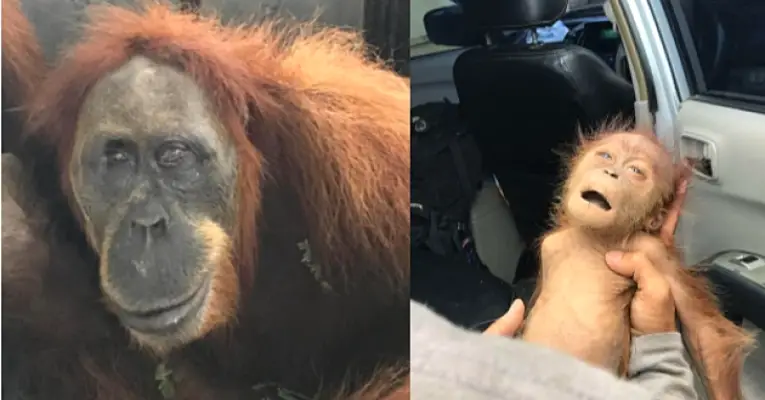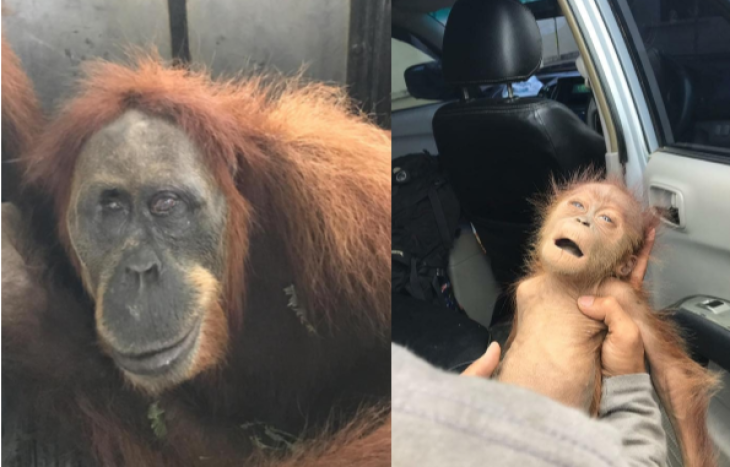Animals
Blinded Orangutan Found at Palm Oil Plantation With 74 Air Gun Pellets in Her Body

If you or your loved ones continue to use palm oil that is harvested in an unsustainable fashion, you are part of the problem. No matter how uncomfortable this truth is, it needs to be shared in an attempt to stop unnecessary tragedies such as this.
Recently, a Sumatran orangutan named Hope, along with her baby, were found at a palm oil plantation in the Subulussalam district of Aceh province on the island of Sumatra. The blinded mammal was suffering from broken bones and was riddled with a whopping 74 air gun pellets.
The mother and her baby were found on March 10 by veterinarians from the Orangutan Information Centre and BKSDA Aceh. They were immediately rushed back to a clinic where Hope’s injuries were examined.
IFLScience reports that Hope was suffering from fractured bones and a sharp tool wound on her right arm. X-rays also revealed that her body contained at least 74 air rifle pellets. Multiple pellets were also found in her eyes. As a result, the orangutan was totally blind and defenseless.
According to her rescuers, the young baby died on the way to the clinic as a result of malnutrition. Had Hope been uninjured and able to see, she could have fed her offspring.
https://twitter.com/KementerianLHK/status/1105670749119901696
The Sumatran orangutan has since undergone surgery to repair a broken arm and remove the air gun pellets. She remains in a “very poor state,” but is expected to recover. the Sumatran Orangutan Conservation Programme (SOCP) in a statement:
“According to our vet, ‘Hope’ will need a long time care and recovery treatment. Especially for her mental rehabilitation since we know this adult female orangutan just lost her little baby when still breastfeeding.”
Flash Update about Orangutan 'Hope'from Sumatran Orangutan Conservation Programme (SOCP) Quarantine and Rehabilitation Center in North Sumatra.Three days under the care and monitoring of the SOCP Vet team, Orangutan 'Hope' looks in better condition. She is starting to eat some fruits and drink milk. But she's still in the intensive care cages. SOCP Vet team is planning to conduct further medical treatment for her bone fracture soon.Stay updated with us and give your best hope to orangutan 'Hope'…Help us to continue the SOCP's much needed welfare and conservation work for orangutan and its habitat. Please visit : www.sumatranorangutan.org/donate..Update terkini tentang Orangutan 'Hope' di Pusat Karantina dan Rehabilitasi Orangutan YEL-SOCP di Sumatera Utara.Setelah tiga hari dalam perawatan dan monitoring intensif tim dokter hewan YEL-SOCP, orangutan 'Hope' tampak dalam kondisi membaik. Dia sudah mulai makan beberapa jenis buah dan juga minum susu. Tapi orangutan masih dalam kandang fasilitas perawatan intensif. Tim dokter hewan sedang merencanakan untuk melakukan tindakan medis lanjutan terhadap kondisi patah tulang yang dialaminya.Tetap update informasnya dengan kita dan sampaikan harapan terbaikmu untuk orangutan 'Hope'…Bantu kami untuk melanjutkan program-program konservasi orangutan dan habitatnya di Sumatera. Silahkan kunjungi : www.sumatranorangutan.org/donate #SaveOrangutan #SumatranOrangutan #OrangutanRehablitation #Hope #74Peluru #SOCP #YEL #PanEco
Posted by Sumatran Orangutan Conservation Programme (SOCP) on Friday, March 15, 2019
“She is starting to eat some fruits and drink milk. But she’s still in the intensive care cages.”
The dangers of palm oil
Palm oil is a cheap and versatile vegetable oil that is used as a biofuel, animal feed and additive in thousands of household and cosmetic products. Indonesia is the world’s largest producer of the oil, which is used in around 50 percent of all consumer goods.
The increasing demand for the product has been cited as a major contributor to the deforestation of some of the world’s most biodiverse forests. In Malaysia and Indonesia, many critically endangered and endemic animals—like orangutans, pygmy elephants, and Sumatran rhinos—are threatened by palm oil cultivation.

According to the IUCN Red List, there are just 13,500 Sumatran orangutans left in the wild. If action isn’t taken to limit palm oil production and protect vulnerable species, stories like Hope’s will only become more common.
What are your thoughts? Please comment below and share this news!
Typos, corrections and/or news tips? Email us at Contact@TheMindUnleashed.com
